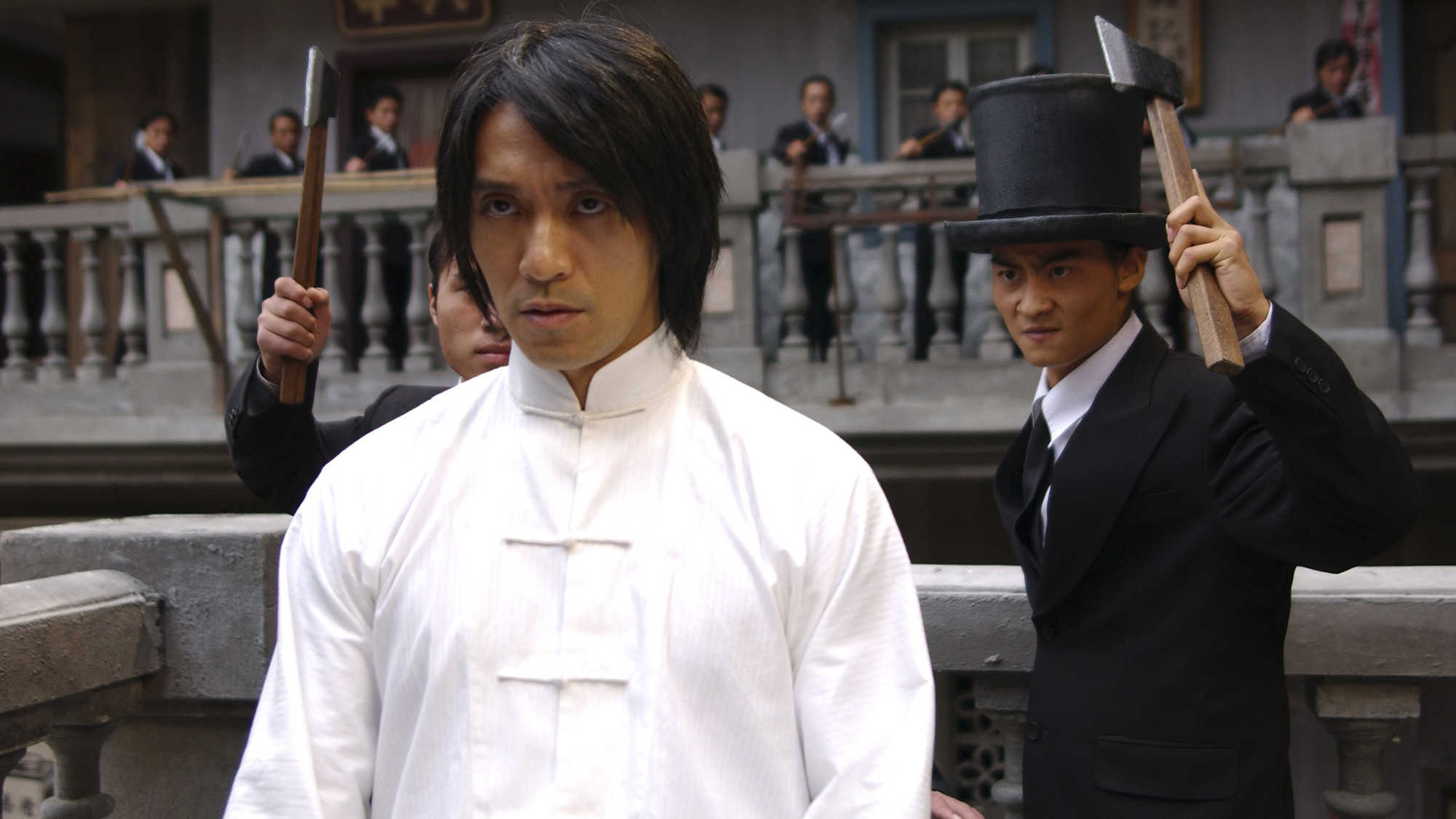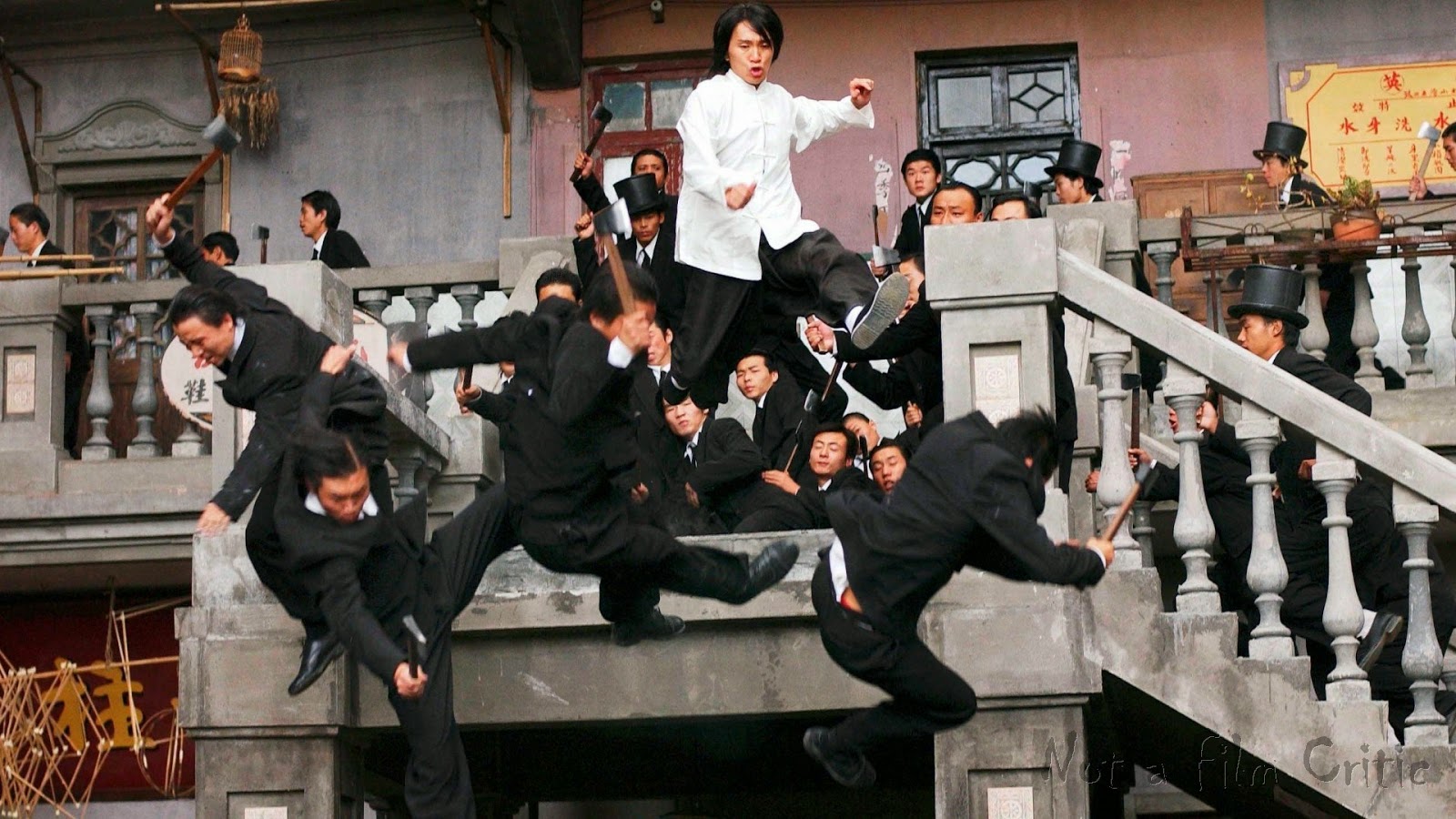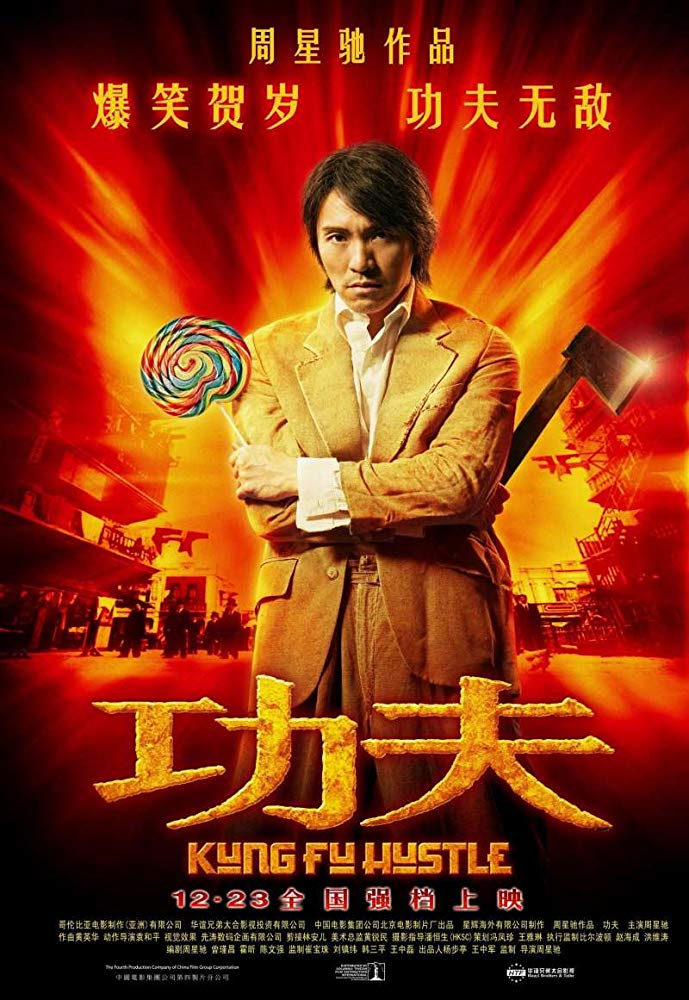(Gong Fu)
Crew
Director – Stephen Chow, Screenplay – Stephen Chow, Tsang Kan Chong, Lola Huo, Chan Man Keung & Huo Xin, Producers – Chui Po Chu, Han San Ping, Jeff Lau, Wang Zhong Jun, Wang Zhong Lei & Yang Bu Ting, Photography – Poon Hang-Sang, Music – Raymond Wong, Visual Effects – Centro Digital Pictures Ltd (Supervisor – Frankie Chung), Makeup Effects – Pacific Ocean Makeup Special Effect, Production Design – Oliver Wong, Action Choreography – Yuen Woo-ping, Additional Action Choreography – Sammo Hung. Production Company – Columbia Pictures Film Production Asia/Huayo Brothers/Taihe Film Investment Co Ltd/Beijing Film Studio of China Film Group Corp/Star Overseas.
Cast
Stephen Chow (Sing), Yuen Qiu (Landlady), Yuen Wah (Landlord), Leung Siu-lung (The Beast), Kwok Chan Kuen (Brother Sum), Chi Chung Lam (Sing’s Sidekick), Chang Kwok Kuen (Brother Sun), Chi Ling Chu (Tailor), Zhi Hua Dong (Donut), Yu Xing (Coolie), Huang Shengyi (Fong), Kang Xi Ja & Hak On Fung (Harpists), Kai Shi Chen (Rabbit-Tooth Jane), Cheng Yan Yuen (Beggar)
Plot
The brutal Axe Gang wield control over most of the country. The down-and-out petty thief Sing and his fat sidekick come to Pig Sty Alley, one of the few areas not controlled by The Axe Gang, and pretend to be Axe Gang members in order to obtain favours but come up against the unexpectedly tough locals. This draws the attention of the real Axe Gang who arrive in the dozens, only to be driven back by three martial arts masters who live among the locals. The Axe Gang bring in assassins, seeking to eliminate the masters, but the landlord and landlady of Pig Sty Alley reveal themselves to be even greater martial artists with amazing abilities.
Stephen Chow is one of the great and underrated talents in the Hong Kong film industry. Chow first appeared as a children’s tv host in 430 Shuttle (1982-91) and then went on to make it as a film actor, achieving notice in All for the Winner/God of Gamblers II (1990), followed by various other films. Not long after this, Chow began to take creative control of his own films, making his debut as director with From Beijing with Love (1994), an hilariously funny spoof of the James Bond films.
Since then Chow has become a triple creative threat, usually directing, writing and starring in his films, where he has perfected an energetic and often quite sophisticated form of knockabout comedy. He has made the almost indescribable Forbidden City Cop (1996); The God of Cookery (1996) about rivalry between television chefs; The King of Comedy (1999), a spoof of the Hong Kong film industry; Shaolin Soccer (2001), which combined flying martial arts of the Wu Xia cycle with soccer; and subsequent to Kung Fu Hustle, the children’s film CJ7 (2008), Journey to the West: Conquering the Demons (2013) and The Mermaid (2016), as well as producing Dragonball: Evolution (2009) and writing/producing Journey to the West: Demon Chapter (2017).
Chow has been a considerable success in Hong Kong/China – indeed, Kung Fu Hustle was the most successful homemade film ever at the Hong Kong box-office. However, up until now international crossover success has been something that had eluded him – Shaolin Soccer was brought up by Miramax, re-edited and then held in limbo – and it was not until Kung Fu Hustle that Stephen Chow achieved a reasonable release in English-speaking countries.

Stephen Chow has constructed Kung Fu Hustle as a parody of Hong Kong’s Wu Xia cinema, which of course found huge success in the West in recent years with The Matrix (1999), Crouching Tiger, Hidden Dragon (2000) and a horde of other films that imitated their moves. Chow has been granted a much larger budget than usual – the production even went to Australia to shoot – and this shows on screen in the lavishness of production values. Chow has also employed Yuen Wo-ping, who has become acknowledged as the god of Hong Kong action choreography ever since the Wachowski Brothers brought him to attention (as well as the lesser-known Sammo Hung who directs several sequences).
It is during the martial arts sequences that Kung Fu Hustle comes to life. The first handful of these are relatively mundane (ie. non-fantastic) – a sequence with the three masters taking on about a hundred or so Axe Gang members all at once – and it is some time before the film opens out into fantastical moves. When it does these are quite stunning. The first up is a bizarrely wacky scene with Stephen Chow and Yuen Qiu racing through the streets at high speeds rather like DC Comics’ The Flash. There then comes a sequence that floors you with the landlord and landlady taking on two assassins who wield a double-decker guzheng harp that produces waves of deadly sound, materializes flung swords and even an entire army of flying undead as they strum its strings. The battles between The Beast and the landlord and landlady, punching people through walls and wielding giant cast iron bells as sound weapons, are hugely entertaining.
The film’s show capper is rightfully the climax where Stephen Chow’s anti-hero emerges into his own and takes on The Beast, with Chow punching hordes of Axe Gang members through walls as though they were cannonballs or sending dozens flying up into the air in unison, and in one wonderfully wacky scene being tossed up into the air, bouncing off the back of a gull and reaching up to touch the face of Buddha before returning to Earth with his Buddha’s Palm powers intact, flattening The Beast in a giant palm imprint in the ground and leaving the outline of a hand blasted through the block of apartments.

It is all immensely entertaining. The plot holding the film together is fairly straightforward as this type of film goes. Stephen Chow specialises in this kind of physical high-energy comedy – the film is often raucous and loud and he never seems to worry too much about making fun of gays or physical deformity. There are however some uproarious slapstick sequences with him being multiply impaled during bumbling sidekick Chi Chung Lam’s attempts to throw knives or in the scenes where he attempts to find an opponent among the gathered crowd of Pig Sty locals.
Chow casts himself as another of the self-effacing loser roles that he seems to have a preference for, although the surprise about this is that for the bulk of the film his character is sidelined and the action carried by the landlord, landlady and others, and it is not until the very last act that he finally emerges into his powers. This tends to throw off the heroic arc of the story – throughout Chow’s loser hero is made the butt of numerous jokes and then all of a sudden abruptly emerges into his powers, which feels like it comes without any heroic earning. Nevertheless, Kung Fu Hustle is an enormously funny and engaging film.
(Winner in this site’s Top 10 Films of 2004 list).


